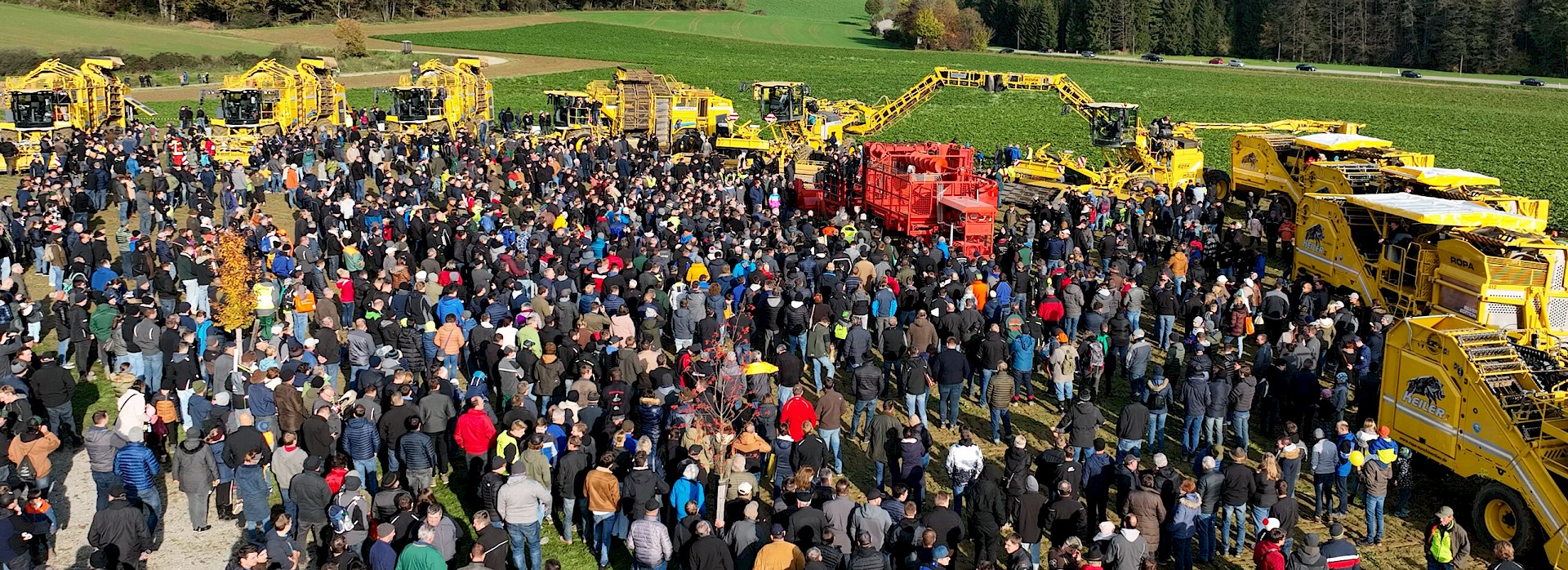50 years of Hermann Paintner harvesting technology - 10 years of ROPA potato technology
The traditional ROPA Open House in Sittelsdorf took place again this year on Sunday, November 6. And this time it was arranged to coincide with the 50th anniversary of Hermann Paintner's first self-propelled sugar beet harvester. Approximately 15,000 visitors came to this major event, which was held for the first time in the last six years. The potato and sugar beet harvesting demonstrations made for an interesting and varied program, as did the large agricultural technology exhibition with numerous exhibitors and the festival hall with entertainments for the young farmers. As a highlight of the day, the visitors could witness the first sugar beet harvester built in 1972, driven by Hermann Paintner, in action in the field.
Agropictures was on-site with the camera and took these spectacular pictures
Spectacular machines, Bavarian hospitality and a lively general program: that's the formula of the successful traditional ROPA Open House, which returned last autumn for the first time after a 6-year break. Over 15,000 visitors accepted the invitation to the company's headquarters in Sittelsdorf and were able to see the latest machines for harvesting sugar beet and potatoes in practical use: the largest and most powerful beet harvesters the ROPA Tiger 6S and the Panther 2S, the new ROPA Maus 6 and two trailed potato harvesters, ROPA Keiler 1 and Keiler 2. Various partner companies presented their machines, some of which were also demonstrated, as a part of an extensive agricultural technology exhibition. In addition to the specialized program, ROPA also focused on cozy togetherness: visitors find time for discussion in the heated plant halls of the new assembly center. For their physical well-being, the visitors were served hearty delicacies, as well as coffee and cakes by the farmers' wives. To the delight of the audience, company founder Hermann Paintner put his very first harvester into service in the field. This ingenious farmer built the machine 50 years ago in the workshop on his farm.
Thank you very much for Christian Leitner of Agropictures for the great, detailed video about the 2022 open house.
Open house exceeds all expectations
Fortunately, the weather was kind to the organizers, the visitors flooded in and it was probably the best-attended Field Day event in the European agricultural technology sector in the past 3 years.
For the first time, potatoes were also harvested with the ROPA Keilers and loaded with the Kartoffelmaus during the Open House field demonstration. The rush on the potato field more than exceeded all expectations. All spectators were very impressed with the demonstration. The most remarkable highlight of the day was saved for the afternoon. Five sugar beet harvesters and the first harvester, built by Hermann Paintner, worked together in the field at the same time.
Morning potato harvest and starch potato loading with the potato loader
ROPA is now known as a premium manufacturer of the trailed potato harvesters. This is primarily due to unique technical features such as the fully hydraulic drive in combination with durable and maintenance-friendly mechanical construction properties.
The demonstration of the trailed single- and double-row potato harvesters took place on a potato field owned by farmer Thomas Bauer, 8 km away from the ROPA plant, in Niederleierndorf. The freshly harvested potatoes were loaded onto trucks by the potato loader Kartoffelmaus.
Sugar beet harvesting with Panther 2S, Tiger 6S and sugar beet loading with the Maus 6
Starting at 10 a.m., various self-propelled harvesters, including the world's most powerful sugar beet harvesters, the Tiger 6S and the Panther 2S, worked on two fields of 15 ha in total, located around the ROPA plant in Sittelsdorf. The sugar beets were loaded immediately after harvest by a new ROPA Maus 6 and shredded and ensilaged at the pilot and test biogas plant.
Demonstrations of technology and innovations on the sugar beet field with harvesting show
In the early afternoon, ROPA presented its complete product range in the field. After the welcoming speech by Hermann Paintner and few words on the current development of the company and new construction by Dr. Eberhard Krayl, Michael Gruber and Dr. Rupert Geischeder presented the technical highlights and latest innovations in the sugar beet and potato technology sector.
Harvesting show - COMPANY FOUNDER AND MANAGING DIRECTOR HERMANN PAINTNER harvests with his FIRST MACHINE CONSTRUCTED IN 1972
The harvesting show, performed by the entire fleet of sugar beet machines, ensured spectacular and unforgettable impressions. Everyone could agree, that a special highlight and probably the most fascinating point of the day was, when the company founder Hermann Paintner started his first harvester made in 1972 and harvested a few bunkers of sugar beet with it.
AGRICULTURAL TECHNOLOGY EXHIBITION
At the extensive agricultural technology exhibition in the festival hall and outside, many companies presented their products, including tractors; harvesting technology; potato storage technology from Bijlsma Hercules; grassland, forestry, manure technology; telescopic loaders, information stands from seed growing companies, biogas equipment suppliers, service providers and much, much more.
Comprehensive supporting program in the festival hall
In addition to the demonstration, the event was held under the banner of ROPA's "togetherness". In the heated plant halls of the new assembly center with a spacious catering area, visitors could take time to discuss ideas and impressions. For their physical well-being, the visitors were served hearty delicacies, barbecue beef, as well as coffee and cakes by the farmers. An array of children's activities on offer with numerous attractions, such as pedal car and tractor courses, kept the "young farmers" occupied.






















































